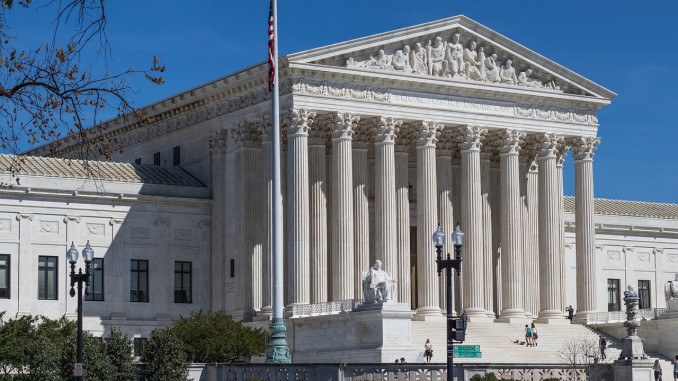
The Supreme Court just made it harder for unions to strike with its decision on June 1 in a case brought by Glacier Northwest – a Seattle concrete company – against a local Teamsters union and some of its members. The decision was 8-1 for the company. The ruling expanded the power of a corporation to sue a striking union and its members for damages to its property during a strike. This decision opens the way for bosses and the judges who answer to them to impose increasing penalties for effective strike actions.
In this case Seattle Teamster truck drivers had walked off the job leaving fresh concrete in trucks, causing non-striking workers and managers to work quickly to remove the concrete so as not to damage the trucks. The company acknowledged that the union had the legal right to strike but it sued the union and the strikers for the cost of the wasted concrete, claiming it was unlawful for the Teamsters to begin a strike without first delivering the already loaded concrete.
Applauding the company’s decision, the three most reactionary Supreme Court judges – Thomas, Gorsuch, and Alito – are clearing a path to give the bosses more tools to weaken unions. Judge Alito was also the mastermind behind the Janus decision that made it harder for unions that organize public sector workers to collect dues.
Since the inception of the National Labor Relations Board (NLRB), and as a result of huge struggles by the workers, U.S. labor law has held that a company has to accept lost business and profits when the workers legally strike. In this case, the Teamsters had a legal right to strike, as the old contract had expired. On the other hand, labor law also says that it is illegal for strikers to damage company property during a strike, and they can be sued for damages if they do so. However, until now, employers were prevented from suing unions and workers for strike-related activity until and unless the NLRB decided the companies had a reasonable case that the union and workers’ actions were not covered by protections provided by federal labor law. This ruling has overturned that principle.
Consequently, employers are now free to harass the workers and the unions with state-level court suits about what they claim is illegal strike activity. It is far from clear what the NLRB, which is charged with defending the workers’ right to struggle against their employers, can do about it.
Workers and unions only got any form of legal recognition for the right to strike after many battles to assert those rights in the face of legal and often violent repression. In the 1920s, workers were often fired just for belonging to a union. Picket lines were attacked by company goons and police. Most of the laws giving some legal protection to strike were only passed after the massive, successful strikes of the 1930s, which often broke the bosses’ laws with tactics like plant occupations.
Many decades have passed since then. The unions created during those struggles were soon taken over by officials inclined to collaborate with management rather than build on the gains won by militant fights. That is how we got unions that negotiate contract after contract full of concessions. These same leaders have done nothing effective to stop the bosses from chipping away at workers’ legal rights as well over decades. However, more and more workers have had enough of concessions and are looking for a way to turn things around. Workers without unions, and that is the case for 94% of private sector workers today, are starting to organize. The bosses, fearing how workers could assert themselves at the expense of record corporate profits, will accelerate their efforts to diminish workers’ legal rights to organize and fight effectively to the point of extinction if we allow it. In their drive for greater profits and power the bosses are planning attacks on our jobs, our wages and working conditions. We can only defend ourselves by organizing to rebuild our power and exerting it forcefully in the battles to come, respecting their laws, or not.

